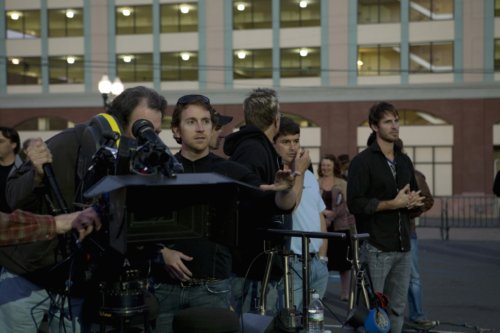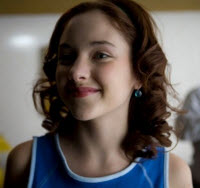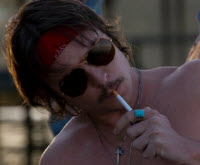Interview: Brandon Freeman, 'Skateland'

One of the independent films I enjoyed at SXSW 2010 was Skateland, set in small-town Texas during the 1980s. Starring Shiloh Fernandez (Deadgirl, Red Riding Hood) and Ashley Greene (The Twilight Saga, Radio Free Albemuth), Skateland was produced by Freeman Films, an Austin-based movie production company founded by Skateland writer/executive producer Brandon Freeman. As a graduate of The University of Texas at Austin, Freeman enjoyed working within the local film community to bring his first feature film to the screen. Skateland opens in Austin this Friday -- check out my SXSW review and Don's review.
I spoke with Brandon Freeman by phone last week as he prepared for the L.A. premiere of Skateland. Find out what he had to say about working with Ashley Greene before her Twilight stardom, the portrayal of the feminist movement of the 80s in his movie and the impact of MTV on small-town Texas after the jump.
Slackerwood: Skateland is your first major film?
Brandon Freeman: It's actually the only film I've done -- my brother Heath [Heath Freeman] and I have been writing scripts and treatments together on the side. In the spring of 2008, we decided to finish a script and film it. Heath lives in L.A. full-time, but we based out of Austin and wrote the script over the course of the summer. We sent it out to a few casting agents in L.A. and received a lot of really great feedback very early on. We decided to go straight into casting and pre-production in late summer of 2008. Once we got on the bus, it never stopped and went all the way through.
We faced a lot of challenges as first-time filmmakers, but we surrounded ourselves with as many good key production folks -- especially based out of Austin which helped us through the process. Our director of photography Peter Simonite is from Austin -- he helped us get the right key grips, the right electrical crew, and the right camera operators. It was very helpful and really enjoyable to work with a community.
Director Anthony Burns is also credited as a co-writer, did he work with you and Heath during the initial treatment?
Anthony grew up with me and my brother in Longview. We were at a wedding in Longview that spring and we were all together there. Anthony had been out in L.A., trying to get jobs. He really wanted to be a writer, and that's kind of what he was working towards out in L.A. That's why we all decided, "Let's just sit down and write together." Heath and I had already come up with the basic screenplay.
It's been a trifecta effort between the three of us -- we all wore multiple hats through the whole film process including casting. Once production started, Heath had to move in more to his actor role and start focusing on that. Tony and I took over and handled production and direction at that point.
Skateland has been frequently described as a "coming of age" movie, centered on Ritchie, the roller rink manager. However, it seemed to me that the focus was more on characters with the ensemble cast -- was that your intent?
 Absolutely! The writing part was extremely important to us and really one of the most enjoyable pieces. What we really intended to do was highlight and illustrate a time frame in the early 80s when times were changing. The feminist movement was kicking into gear, and we see that shift in gender role in the home and the workplace. We really wanted to emphasize that in Skateland, with strong feminine characters with the mom Debbie Wheeler [Melinda McGraw] and younger sister Mary [Haley Ramm, pictured at right], as well as with the girlfriend Michelle [Ashley Greene].
Absolutely! The writing part was extremely important to us and really one of the most enjoyable pieces. What we really intended to do was highlight and illustrate a time frame in the early 80s when times were changing. The feminist movement was kicking into gear, and we see that shift in gender role in the home and the workplace. We really wanted to emphasize that in Skateland, with strong feminine characters with the mom Debbie Wheeler [Melinda McGraw] and younger sister Mary [Haley Ramm, pictured at right], as well as with the girlfriend Michelle [Ashley Greene].
We knew Shiloh Fernandez's role of Ritchie Wheeler would be the running theme through the film, but we wanted each character to have their own moment of development and really have a purpose for it. It wasn't to have any idle chatter. Rather what was situational -- what is the underlying theme of what's taking place in small-town Texas, between the late 70s and the 80s.
This is the backdrop of this time period where a lot of things shifted for our economy as we were coming out of a really deep recession. Moral values and the traditional nuclear family were shifting. Pop culture was being pumped into homes that really didn't have any exposure to that before. Not until you had MTV that really said "Hey, this is what's going on pop culture-wise." That all started in the early 80s -- before that you didn't have that level of exposure.
That changed behavior and what people's goals were. Back in the 70s in a small town, everyone was fairly lackadaisical. The graduation rate was extremely low, about 15 to 20 percent actually went to college.
The actual roller rink Skateland itself was a metaphor for that story and backdrop of a change in the times. It's not really that "coming of age" was a focus so much, we really wanted to focus on what these changes -- economically, socially, morally -- how theses things were impacting small-town America in a sense. We didn't want to beat people over the head, we just wanted Skateland to be a subtle portrait of this time.
 A strength of Skateland is the character development for the females -- Debbie and Mary Wheeler and Michelle Burkham, but also there's more to the male lead of Brent Burkham [Heath Freeman, pictured at right] with his own personal story.
A strength of Skateland is the character development for the females -- Debbie and Mary Wheeler and Michelle Burkham, but also there's more to the male lead of Brent Burkham [Heath Freeman, pictured at right] with his own personal story.
The character of Brent highlights that person that was really viewed as being very successful -- he's the cool kid who's walked away from small-town Texas and he's a motorcycle rider that everybody looked up to in a way. There's a little bit of irony there, because he's actually kind of a failure in the more modern sense.
Back in that time period, that was something we experienced. We knew guys like Brent Berkham and that's why we created that character. Guys that were motocross were a big deal -- that was achieving great success. In small-town Texas, it wasn't being a PGA golfer, we didn't really even know what that was there.
There's been some comparisons to Dazed and Confused, what are your thoughts on those observations?
I'm not really sure what the relationship is to Dazed and Confused, which is really its own individual piece of work. I think Skateland is compared because like Dazed and Confused, it's a period piece and it's set in Texas. I think that some levels of Skateland that are comedic and fun, but it's really more of a dramedy -- there's a lot of drama in this film. We focus a lot more on character development.
Dazed and Confused is a great time capsule, but I just don't know from a comparative standpoint how it really relates to our film. It wasn't really an influence on us in the filmmaking process. We've had reviews that have compared Skateland to The Last Picture Show and American Graffiti. It's more of a character-driven portrait, but again it's such a different film. There could be worse comparisons.
What was it like working on Skateland with young stars Ashley and Shiloh as well as seasoned actors including Brett Cullen and Melinda McGraw?
Across the board we had so many great people that came together from a cast standpoint to make the film. Skateland speaks to everyone a little bit differently, which was one of the underlying themes when we were casting here in L.A. Shiloh drove in from Northern California to read for the part. Opposed to just sitting down and reading his lines, he sat down and basically told us the story. He said, "This is what this meant to me when I read the script, and this is how it related to my life."
As far as Ashley Greene, at that time Twilight hadn't even come out, when we were casting for Skateland. Ashley was relatively unknown, and that was the only role that she had ever done. She just blew us away, she just took the character and made it her own. It was exactly what we wanted, and the chemistry with her and my brother Heath as his younger sister just worked.
As far as Ritchie, Shiloh really embodied the character that we were trying for Ritchie. He understood and got it so well that I think that's why it worked. As for Ritchie's young sister Mary, Haley Ramm was one of the first girls cast for that role, and we didn't even need to see anyone else -- she was perfect. We lucked out, so to speak. We probably wouldn't be able to assemble that great a cast again, for a small low-budget independent film.
Any projects in the works on your own or with your brother Heath?
We are working on other projects. We've seen a ton of projects come out as producers or directors -- we've passed on everything that we've seen so far, because we wanted to get Skateland out and behind us. Also I think our next project will be something that we write, produce, and direct again, just because the creative process is what is so rewarding -- as opposed to just jumping in on somebody else's project as a producer or director. I'm not saying that won't happen if the right project came around, but what was so enjoyable for us was the ability to say, "Okay, we are stopping everything now, we're going to Austin and we're just going to write. We are going to really get ourselves into this creative process." Then seeing that actually grow and actually filming and you're working with actors and then seeing it in an editing room -- I can't explain how much fun it is.

